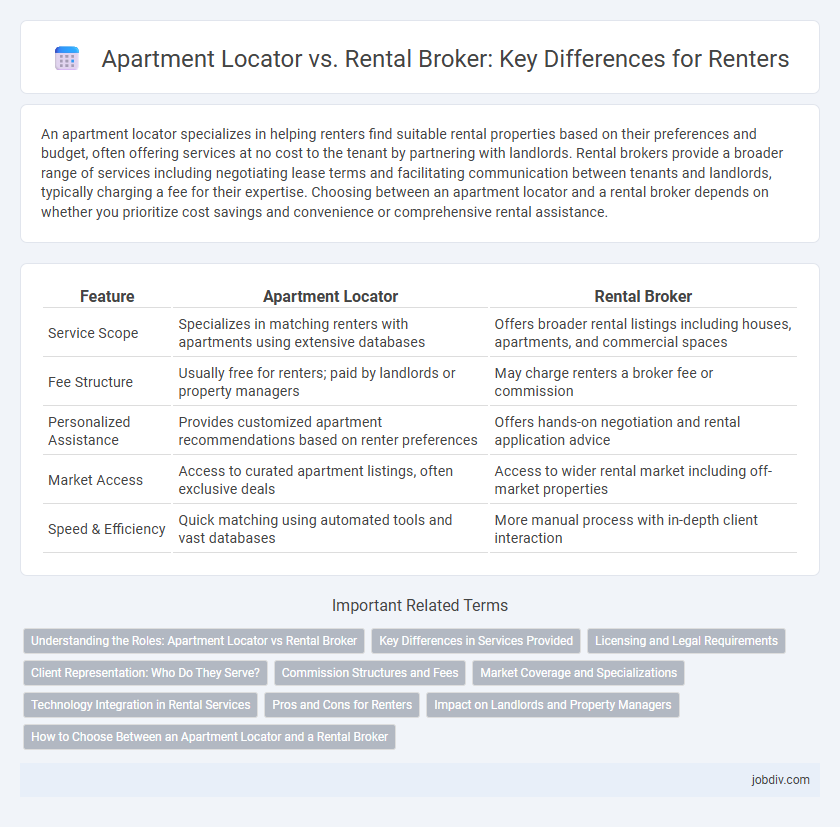An apartment locator specializes in helping renters find suitable rental properties based on their preferences and budget, often offering services at no cost to the tenant by partnering with landlords. Rental brokers provide a broader range of services including negotiating lease terms and facilitating communication between tenants and landlords, typically charging a fee for their expertise. Choosing between an apartment locator and a rental broker depends on whether you prioritize cost savings and convenience or comprehensive rental assistance.
Table of Comparison
| Feature | Apartment Locator | Rental Broker |
|---|---|---|
| Service Scope | Specializes in matching renters with apartments using extensive databases | Offers broader rental listings including houses, apartments, and commercial spaces |
| Fee Structure | Usually free for renters; paid by landlords or property managers | May charge renters a broker fee or commission |
| Personalized Assistance | Provides customized apartment recommendations based on renter preferences | Offers hands-on negotiation and rental application advice |
| Market Access | Access to curated apartment listings, often exclusive deals | Access to wider rental market including off-market properties |
| Speed & Efficiency | Quick matching using automated tools and vast databases | More manual process with in-depth client interaction |
Understanding the Roles: Apartment Locator vs Rental Broker
An apartment locator specializes in helping renters find suitable apartments based on their preferences, often working with multiple property management companies to provide a wide range of options. Rental brokers offer a broader service that can include negotiating lease terms, assisting with paperwork, and sometimes managing rental properties on behalf of owners. Understanding these roles helps renters choose the right professional for targeted apartment searching or comprehensive rental assistance.
Key Differences in Services Provided
Apartment locators specialize in matching renters with available apartments based on their preferences, often providing extensive listings and personalized search assistance without charging tenants directly. Rental brokers offer broader services, including negotiating lease terms, arranging property showings, and sometimes managing rental agreements, typically earning commissions from landlords. The key difference lies in the scope of support: apartment locators focus on searching and matching, while rental brokers handle negotiation and transaction facilitation.
Licensing and Legal Requirements
Apartment locators typically do not require a real estate license, as they act as referral agents connecting renters with available units, often receiving fees from landlords rather than tenants. Rental brokers must hold a valid real estate license and comply with state-specific regulations governing rental transactions, ensuring legal accountability and consumer protection. Understanding these licensing and legal distinctions helps renters choose the appropriate professional for their apartment search needs.
Client Representation: Who Do They Serve?
Apartment locators serve tenants by helping them find apartments that match their specific preferences and budget without charging fees, acting as client advocates throughout the search process. Rental brokers primarily represent landlords, aiming to lease available units quickly while providing clients with listings, but their loyalty often lies with property owners. Understanding who each party serves allows renters to choose between tenant-focused assistance or broker-facilitated landlord access when searching for apartments.
Commission Structures and Fees
Apartment locators typically charge a fee paid by the landlord or property management, which means renters often access their services at no direct cost. Rental brokers may require tenants to pay a commission, usually equivalent to one month's rent or a percentage of the lease value, depending on the market. Understanding these commission structures helps renters evaluate upfront costs and potential savings when seeking rental properties.
Market Coverage and Specializations
Apartment locators typically cover a broad market with access to numerous apartment complexes across various neighborhoods, providing wide-ranging rental options. Rental brokers often specialize in specific property types or luxury segments, offering tailored expertise and exclusive listings within targeted markets. Focusing on market coverage and specializations helps renters choose between comprehensive searches and niche market knowledge.
Technology Integration in Rental Services
Apartment locators utilize advanced technology platforms and AI-driven algorithms to match renters with properties that meet specific criteria efficiently, enhancing the rental search experience. Rental brokers often combine personalized service with digital tools like virtual tours and automated scheduling to streamline client interactions. Integrating real-time data analytics and mobile apps, both services improve transparency and speed in the rental market.
Pros and Cons for Renters
An apartment locator offers personalized service by matching renters with available listings based on their preferences, saving time and effort, but may have limited options tied to specific property partnerships. Rental brokers provide access to a broader range of listings, including off-market properties, increasing the likelihood of finding unique apartments, though their fees can be higher and vary widely. Renters must weigh the convenience and targeted assistance of locators against the expansive inventory and potential cost differences of brokers when seeking the ideal rental.
Impact on Landlords and Property Managers
Apartment locators streamline the tenant search by providing landlords and property managers with pre-qualified renters, reducing vacancy rates and marketing expenses. Rental brokers offer personalized leasing services, often securing higher rental income by negotiating favorable terms on behalf of property owners. Both professionals impact landlord profitability, but locators primarily focus on volume and efficiency, while brokers emphasize tailored tenant matching and lease optimization.
How to Choose Between an Apartment Locator and a Rental Broker
Choosing between an apartment locator and a rental broker depends on your specific rental needs and budget. Apartment locators typically offer free services by partnering with landlords, providing access to a broad range of listings based on your preferences. Rental brokers may charge fees but offer personalized guidance, negotiation assistance, and access to exclusive rental units in competitive markets.
Apartment Locator vs Rental Broker Infographic

 jobdiv.com
jobdiv.com